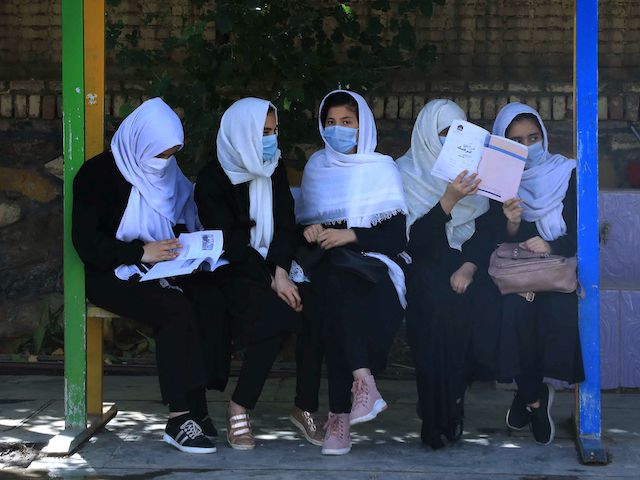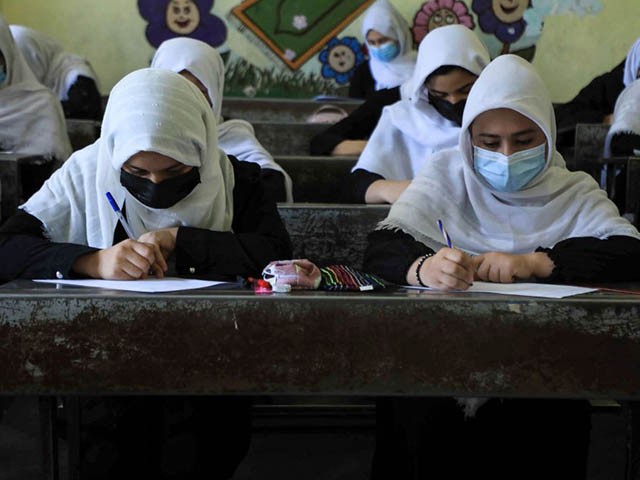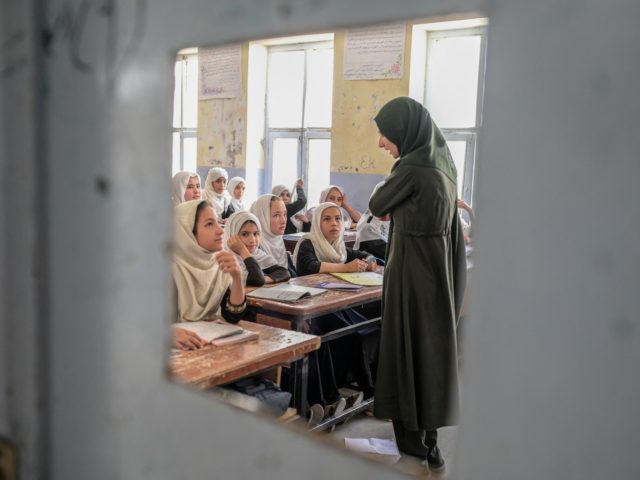The Wall Street Journal (WSJ) on Tuesday reported the Taliban has quietly permitted teenage girls to return to school in four of Afghanistan’s northern provinces, ostensibly because Taliban 2.0 is willing to “shape policy around cultural differences across Afghanistan, unlike in the 1990s, when they imposed harsh social rules on everyone under their rule.”
Across most of Afghanistan, the Taliban has reopened secondary schools for boys only, effectively barring girls from attending anything above the sixth grade. According to the WSJ’s sources – which included teachers, students, and an uncharacteristically subdued Taliban spokesman – teenage girls were allowed to go back to school in the provinces of Balkh, Kunduz, Sar-e-Pul, and Jawzjan, territory that includes the large cities of Mazar-e-Sharif and Kunduz.
“Even where schools have reopened, not all female students have returned to class. In one school in the northern city of Kunduz, a third of the 3,000 students are absent, according to its principal. Many families have fled the city. Others don’t trust assurances from local Taliban that girls are allowed to go to school. Some worry that Taliban fighters will harass their teenage daughters on their way to school,” the WSJ reported.
Teachers in Afghanistan also noted the Taliban has comprehensively wrecked the national economy, so there is little money to pay teachers to hold classes for anyone. Schools for boys will likely receive most of the scarce funding for education.
Al Jazeera News on Wednesday quoted U.N. reports that found over 2.2 million Afghan girls were unable to attend school even before the Taliban takeover, in part because the U.S.-supported civilian government did not properly fund education or ensure there were enough safe buildings to hold classes in.

Schoolgirls sit at the schoolyard in Herat on August 17, 2021, following the Taliban’s takeover of the country. (Aref Karimi/AFP via Getty Images)
A teacher in Balkh said the Taliban is telling teachers to knock on the doors of female students who refuse to attend classes and “tell them to come to school.” Taliban officials are reportedly keeping tabs on how many girls go to school in the areas where they have been given permission to do so.
Those details make it sound like the Taliban’s major concern might be impressing international monitors with how “progressive” it has become.
The U.N., United States, European governments, and humanitarian organizations frequently state that the Taliban will be judged on its treatment of women when decisions are made to release frozen Afghan capital and humanitarian aid.
Al Jazeera noted the Taliban’s friends in Pakistan and Qatar have been pushing it to allow girls back into school in order to placate the international community, and because they fear the Taliban’s primitivism will make their own governments look bad by association.
“The idea that women should not be educated is just not Islamic. It has nothing to do with religion,” Pakistani Prime Minister Imran Khan declared recently, while the Qataris offered themselves as an example of how to run an “Islamic system” that welcomes women into schools and the workforce.
The Taliban Ministry of Education did not reply when the WSJ asked for confirmation that northern schools are open to girls, but a spokesman for the ominously-named Ministry of Suppressing Vice and Promoting Virtue said the report was accurate and promised similar reopenings “will proceed throughout the country.”
Other Taliban ministers have claimed a panel of Islamic scholars must thoroughly debate the issue of allowing girls into secondary school before national policy can be set, or claimed Western demands for the education of women are a form of cultural imperialism the new Islamic Emirate of Afghanistan will steadfastly resist.
“In Afghanistan, one thing is what Afghans want. Another thing is what the international community wants,” Taliban Foreign Minister Amir Khan Muttaqi sneered on Monday when pressed about the ban on girls in school.
Muttaqi hinted that opening the international money spigots to the Taliban might persuade it to take human rights issues more seriously, repeating his regime’s demand for the U.S. to unlock over $9 billion in frozen Afghan government assets.

Schoolgirls attend class in Herat on August 17, 2021, following the Taliban stunning takeover of the country. (AREF KARIMI/AFP via Getty Images)
“The international community needs to start cooperating with us. With this, we will be able to stop insecurity and at the same time with this, we will be able to engage positively with the world,” he said.
“How is it possible that schools are open in the north but not in the south? If there is a law, it should be implemented in every corner of the country. Every official is making decisions on his own in his province,” a teacher in southern Afghanistan complained to the WSJ.
The answer appears to be that northern Afghanistan is dominated by several ethnic groups with more relaxed attitudes toward allowing girls in school, including the Tajiks, Uzbeks, and Hazara, while the Pashtun majority in southern Afghanistan is more sympathetic to the Taliban’s extremist interpretation of Islamic law.
“The Taliban in Kandahar are much more conservative. They see schools as infidel projects,” explained education activists Pashtana Durrani, who managed to slip about a hundred girls into secret schools she opened ten days go.
“They have to do something. If not for legitimacy, then for the money,” she said of the Taliban’s likely response to international pressure for women’s rights.
17-year-old Rahela Nussrat of Kabul told Al Jazeera she is studying English and hoping to apply for an education abroad.
“I studied for 14 years in Kabul, I went through primary and secondary school during a war, but now I will have to leave the country. I will apply to universities abroad and some other country will take me and my talents, because they know it’s not possible to study in a Taliban-led Afghanistan,” she said.

COMMENTS
Please let us know if you're having issues with commenting.